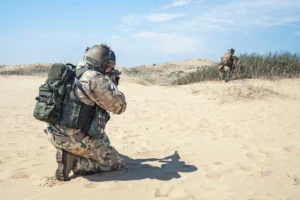A dedicated docket for veterans will begin in Toledo Municipal Court early next year, aimed at connecting justice-involved veterans with treatment to avoid incarceration.
The courts goal is to intervene and address underlying issues for veterans, charged with misdemeanors, who are deemed a high risk to reoffend, often because of mental health or substance abuse issues. Post-traumatic stress disorder and traumatic brain injuries also may be contributing factors.
To qualify for the court, veterans must plead guilty or no contest. Its a partnership among the court, probation officers, and the U.S. Department of Veterans Affairs, which provides the treatment for the program. Judge William Connelly will preside over the court.
The program will begin a soft launch next month, with the first day in court slated for Jan. 16. Organizers are determining who will be the first participants, reaching out to police and corrections officials to identify veterans who might qualify.
When its up and running, the court will meet a minimum of twice a month. Judge Connelly said the goal is to not exceed 65 active participants in 2014 as organizers fine-tune the program.
The first dedicated veterans docket began in 2008 in Buffalo, with Judge Robert Russell, who noted veterans coming before his court with problems stemming from a difficult readjustment to civilian life. Since then, veterans courts have developed all over the country.
In Ohio, Toledo will join four courts: Hamilton County Court of Common Pleas, Mansfield Veteran Treatment Court, Stark County Veterans Treatment Court, and Youngstown Veterans Treatment Court.
Toledos docket was more than two years in the making. Judge Connelly sought information from the V.A. Ann Arbor Healthcare System and went to Youngstown to see how the court there operated. He said he is waiting on the final go-ahead from the Ohio Supreme Court for the dedicated docket, something he said hes confident wont be a problem.
In his preparation, Judge Connelly said he began to better understand how the trauma of war can lead to run-ins with the law back home. He watched a video of American servicemen driving a Humvee with determination through Baghdad, stopping for nothing despite heavy traffic and obstacles. The rush, Judge Connelly would learn, was because of potential danger on the street from the buildings above. The next clip showed a veteran driving back home who began to speed through a construction zone, growing tense in the restricted space.
He felt trapped, paralyzed, Judge Connelly said. He called it an eye-opening experience to the triggers that can agitate veterans struggling to readjust.
Veterans Affairs estimates between 11 percent and 20 percent of veterans who served in the Afghanistan and Iraq wars suffer from post-traumatic stress disorder, as well as 12 percent of Gulf War veterans. The agency says about 30 percent of Vietnam veterans will have PTSD in their lifetime.
Symptoms of PTSD can include anger and irritation, along with feelings of jumpiness and trouble concentrating. Readjustment problems often compound on one another. Veterans Affairs estimates more than 1 in 5 veterans with PTSD also have substance use disorder.
Veterans courts target veterans who are at high risk of reoffending without intervention to address these underlying issues, said Melody Powers, a Veteran Justice Outreach Coordinator for the V.A. Ann Arbor Healthcare System. Leslie Witherell, also a specialist with the V.A. in Ann Arbor, will coordinate the Toledo court.
Most offenses are directly related to their time in service or mental health, Ms. Powers said, adding that infractions include speeding, drunken or reckless driving, and domestic violence. Through an individualized treatment program, veterans have access to physical and mental health services and substance abuse treatment to ease readjustment, as well as housing and education resources.
Close supervision is important, Ms. Powers said, because the judge is putting trust in Veterans Affairs to provide resources and treatment in lieu of sentencing. Participants report to the judge monthly and to probation offices twice a month. They must attend all V.A. appointments.
Sentencing occurs upon completion, when the judge could agree to a reduced charge or could dismiss the charges entirely.
In the meantime, the mission is to get the word out to officials who could refer veterans to the court: police officers, prosecutors, officials at the jail, even emergency room doctors who might run into justice-involved veterans, Judge Connelly said.
Another key to a veterans courts success is the involvement of mentors, other veterans with common experiences who guide the participants through the process and offer support. The result is a court that has a different feel, Ms. Powers said.
Many participants say it was the best thing to ever happen to them, she said. Ive never seen people look forward to coming to court.
Veterans form relationships with their mentors and other participants. They bring their families to court and come early to chat and catch up. A training program is set for veterans looking to be a mentor in January before the court is in session. Ms. Powers said the goal is for veterans who have completed the program to return as mentors to support future participants.
Its the right thing to do. They deserve to be welcomed and honored, she said. These arent the men and women we want sitting in our jails.





